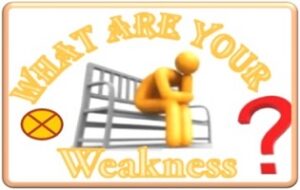
- Understand why it’s being asked.
First, it’s important to consider why the interviewer might ask this question. It’s not always to try to trick you or to try to make you look bad. Sometimes the employer needs to know what kind of support or training you might require when first hired.
- Listen to the question.
Second, listen to the question and answer it the way it’s being asked. If the interviewers only ask for one weakness, only give one. If they ask for weaknessES (plural), then show you can follow directions, but only give two!
(Believe me, this is not the time to start making a laundry list of your negatives!)
- Avoid canned answers!
Third, do NOT give a canned answer like the ones above.
Just don’t.
Ever!
- Never negate your strengths!
Fourth, do NOT give the same answer you gave for the greatest strengths question. I actually see people doing this all the time. They’ll begin their answer with,
“Well sometimes my strength is my weakness because…BLAH, BLAH, BLAH.”
The last thing you want to do is negate your strengths!
- Never answer with a trait.
Fifth, do NOT give a personality trait as your answer.
Why? Because traits are ingrained and are difficult to change.
Instead, give a SKILL since skills can easily be learned.
No one person possesses every skill, so you probably have a few examples to choose from, allowing you to answer honestly.
Just make sure it’s not a skill heavily required for the job. Instead, use one only slightly related to the job.
- Follow up with a positive.
Sixth, once you briefly give your answer, then follow up with a positive on how you’re either trying to overcome your weakness or how you’re able to compensate for it.
PASSABLE ANSWER: Disguise strength as a weakness.
Example: “I sometimes push my people too hard. I like to work with a sense of urgency and not everyone is always on the same wavelength.”
Drawback: This strategy is better than admitting a flaw, but it’s so widely used, it is transparent to any experienced interviewer.
BEST WAY to ANSWER:
Assure the interviewer that you can think of nothing that would stand in the way of you performing in this position with excellence. Then, quickly review your strongest qualifications.
Example: “Nobody’s perfect, but based on what you’ve told me about this position, I believe I’d make an outstanding match. I know that when I hire people, I look for two things most of all. Do they have the qualifications to do the job well, and the motivation to do it well? Everything in my background shows I have both the qualifications and a strong desire to achieve excellence in whatever I take on. So I can say in all honesty that I see nothing that would cause you even a small concern about my ability or my strong desire to perform this job with excellence.”
Alternate strategy (if you don’t yet know enough about the position to talk about such a perfect fit):
Instead of confessing a weakness, describe what you like most and like least, making sure that what you like most matches up with the most important qualification for success in the position, and what you like least is not essential.
Example: Let’s say you’re applying for a teaching position. “If given a choice, I like to spend as much time as possible in front of my prospects selling, as opposed to shuffling paperwork back at the office. Of course, I long ago learned the importance of filing paperwork properly, and I do it conscientiously. But what I really love to do is sell (if your interviewer were a sales manager, this should be music to his ears.)



